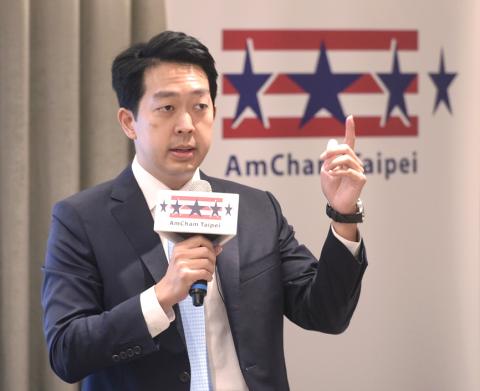Most US companies operating in Taiwan are optimistic about the nation’s economy and their profit outlooks this year, but voiced grave concerns about energy sufficiency and strict labor rules, a survey released yesterday by the American Chamber of Commerce in Taipei (AmCham) found.
The annual poll of 198 member companies showed that 81 percent are optimistic about revenue growth this year, up from 56.1 percent last year, while 79 percent are upbeat about their three-year outlook.
“The views in this survey are important, because they come from business leaders with broad international experience and valuable expertise in sectors crucial to Taiwan’s continued success,” AmCham chairman Albert Chang (章錦華) told a news conference.

Photo: Chang Chia-ming, Taipei Times
The trade group of 1,000 members from more than 500 companies plans to create an industry council with the government to help increase foreign investment in Taiwan.
This year, it is to help attract 10 multinational corporations to make Taiwan their operation base in Asia, Chang said, adding that AmCham is working on the details and might provide more details at its annual Hsieh Nien Fan (謝年飯) banquet on March 21.
Ranking US diplomatic officials are also to join the event intended by the trade group to thank Taiwanese government officials for their cooperation with the foreign business community, he said.
US firms have expressed a keen interest in the Internet of Things (IoT), biotechnology and energy businesses, encouraged by the government’s efforts to shore up the “5+2” innovative industries, Chang said.
“Executives feel a sense of urgency for innovation as the world grows more competitive. We hope to begin discussing concrete ways soon,” he said.
However, the chamber raised doubts over the feasibility of Taiwan’s aim to become nuclear free by 2025.
Power supply sufficiency, voltage stability and electricity costs are all vital concerns, with 84.46 percent of respondents worried whether electricity supply can meet demand, the survey found.
AmCham is to push for further revisions to the Labor Standards Act (勞動基準法), as its members feel that current regulations are not flexible enough to meet the needs of a knowledge-based economy, said Seraphim Ma (馬靜如), a senior partner at global law firm Baker McKenzie.
“We welcome the recent revisions, but an overwhelming majority of respondents support further revisions to exempt professional and managerial talent from the rigidities of existing regulations,” Ma said.
About half of the respondents said that labor issues are likely to be a key factor in their decisions on future business expansion in Taiwan.
Member companies were also critical of US President Donald Trump’s decision to withdraw from the Trans-Pacific Partnership, saying Washington’s foreign policy and trade-related initiatives have put them at a competitive disadvantage in the Asia-Pacific region.

Intel Corp chief executive officer Lip-Bu Tan (陳立武) is expected to meet with Taiwanese suppliers next month in conjunction with the opening of the Computex Taipei trade show, supply chain sources said on Monday. The visit, the first for Tan to Taiwan since assuming his new post last month, would be aimed at enhancing Intel’s ties with suppliers in Taiwan as he attempts to help turn around the struggling US chipmaker, the sources said. Tan is to hold a banquet to celebrate Intel’s 40-year presence in Taiwan before Computex opens on May 20 and invite dozens of Taiwanese suppliers to exchange views

Application-specific integrated circuit designer Faraday Technology Corp (智原) yesterday said that although revenue this quarter would decline 30 percent from last quarter, it retained its full-year forecast of revenue growth of 100 percent. The company attributed the quarterly drop to a slowdown in customers’ production of chips using Faraday’s advanced packaging technology. The company is still confident about its revenue growth this year, given its strong “design-win” — or the projects it won to help customers design their chips, Faraday president Steve Wang (王國雍) told an online earnings conference. “The design-win this year is better than we expected. We believe we will win

Chizuko Kimura has become the first female sushi chef in the world to win a Michelin star, fulfilling a promise she made to her dying husband to continue his legacy. The 54-year-old Japanese chef regained the Michelin star her late husband, Shunei Kimura, won three years ago for their Sushi Shunei restaurant in Paris. For Shunei Kimura, the star was a dream come true. However, the joy was short-lived. He died from cancer just three months later in June 2022. He was 65. The following year, the restaurant in the heart of Montmartre lost its star rating. Chizuko Kimura insisted that the new star is still down

While China’s leaders use their economic and political might to fight US President Donald Trump’s trade war “to the end,” its army of social media soldiers are embarking on a more humorous campaign online. Trump’s tariff blitz has seen Washington and Beijing impose eye-watering duties on imports from the other, fanning a standoff between the economic superpowers that has sparked global recession fears and sent markets into a tailspin. Trump says his policy is a response to years of being “ripped off” by other countries and aims to bring manufacturing to the US, forcing companies to employ US workers. However, China’s online warriors